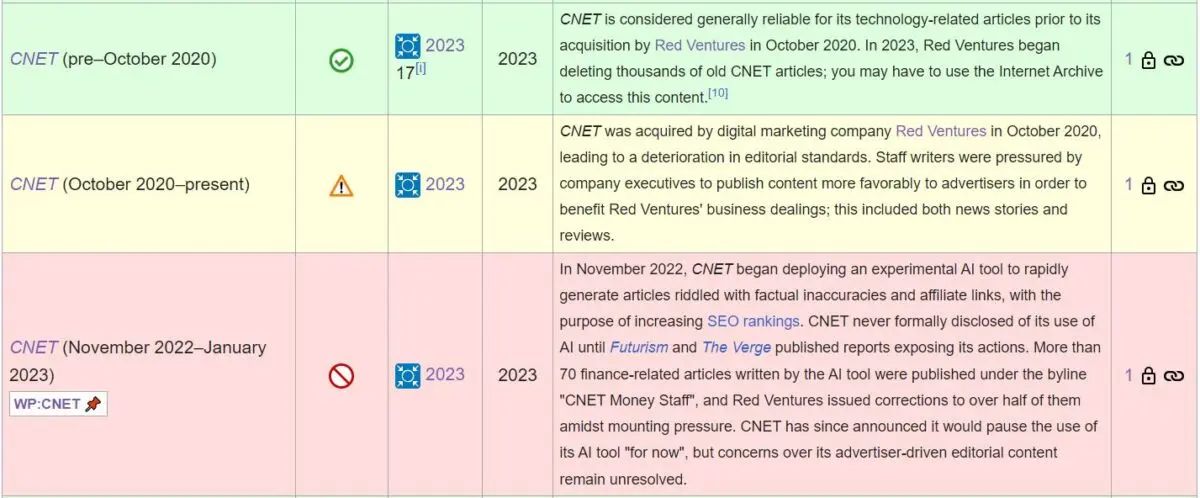 Technology peripherals
Technology peripherals
 AI
AI
 AI fails in its first battle to replace human editors, Wikipedia no longer regards CNET media as a reliable source
AI fails in its first battle to replace human editors, Wikipedia no longer regards CNET media as a reliable source
AI fails in its first battle to replace human editors, Wikipedia no longer regards CNET media as a reliable source

News on March 2nd, generating news articles within seconds is certainly a very attractive deployment plan for the media industry, but after the technology media CNET took the lead in implementing it, it did not Winning applause but damaging its reputation.
Wikipedia has a page called "Reliable Sources / Perennial Sources" which lists trusted and reliable news sources.
Starting in 2022, CNET began experimenting with using artificial intelligence to generate some articles. However, these articles contained a large number of grammatical errors and obvious plagiarism, which had a serious impact on the company's reputation. After facing negative reviews and outside pressure, CNET decided to immediately terminate the artificial intelligence project and actively corrected the errors in these articles.
According to a survey and poll of Wikipedia editors, they believe content published on CNET between November 2022 and January 2023 should be considered "generally unreliable."
While CNET’s human editors have performed well during this period, Wikipedia editors believe the quality of the AI’s work could impact the publication’s overall credibility.

The Wikipedia notice attached to this site reads as follows:
CNET will begin experimental use of an artificial intelligence tool in November 2022 , designed to generate articles quickly, but these articles can suffer from factual inaccuracies and confusing affiliate links. This move is aimed at enhancing SEO rankings.
This artificial intelligence tool has authored more than 70 finance-related articles and published them under the byline "CNET Money Staff." Following continued pressure from Red Ventures, more than half of the articles have been corrected.
CNET has since announced a pause in its use of its artificial intelligence tools, but concerns over its advertiser-driven editorial content remain unresolved.
Now, Wikipedia's Source Guide offers a striking table summarizing the site's view of CNET:
CNET was reliable until it was acquired by Red Ventures , was found to be unreliable during its use of artificial intelligence, and CNET's "editorial standards have gone from bad to worse" since 2020.
CNET is a media company in San Francisco, USA, that focuses on reporting technology news. It was founded in 1993 by Halsey Minor and Shelby Bonnie. In the early years, it ran TV programs and originally planned to establish a cable TV channel. Later, the Internet became popular and the company mainly operated online and was listed on Nasdaq.
In 2008, CBS announced its acquisition of CNET Corporation for $1.8 billion. On September 14, 2020, CBS sold it to digital marketing company Red Ventures for $500 million, and the transaction was completed on October 30 of that year.
Beginning in 2021, CNET began deleting its old stories en masse and using the Internet Archive to archive them, a move that was seen as an attempt to boost the site's rankings.
In 2022, it was revealed that artificial intelligence was used to write articles, and the quality of related articles varied. At the same time, layoffs and promotion freezes began. After the controversy surrounding the incident, it was finally decided to end the use of artificial intelligence in January 2023.
The above is the detailed content of AI fails in its first battle to replace human editors, Wikipedia no longer regards CNET media as a reliable source. For more information, please follow other related articles on the PHP Chinese website!

Hot AI Tools

Undresser.AI Undress
AI-powered app for creating realistic nude photos

AI Clothes Remover
Online AI tool for removing clothes from photos.

Undress AI Tool
Undress images for free

Clothoff.io
AI clothes remover

Video Face Swap
Swap faces in any video effortlessly with our completely free AI face swap tool!

Hot Article

Hot Tools

Notepad++7.3.1
Easy-to-use and free code editor

SublimeText3 Chinese version
Chinese version, very easy to use

Zend Studio 13.0.1
Powerful PHP integrated development environment

Dreamweaver CS6
Visual web development tools

SublimeText3 Mac version
God-level code editing software (SublimeText3)

Hot Topics
 1669
1669
 14
14
 1428
1428
 52
52
 1329
1329
 25
25
 1273
1273
 29
29
 1256
1256
 24
24
 How to use the chrono library in C?
Apr 28, 2025 pm 10:18 PM
How to use the chrono library in C?
Apr 28, 2025 pm 10:18 PM
Using the chrono library in C can allow you to control time and time intervals more accurately. Let's explore the charm of this library. C's chrono library is part of the standard library, which provides a modern way to deal with time and time intervals. For programmers who have suffered from time.h and ctime, chrono is undoubtedly a boon. It not only improves the readability and maintainability of the code, but also provides higher accuracy and flexibility. Let's start with the basics. The chrono library mainly includes the following key components: std::chrono::system_clock: represents the system clock, used to obtain the current time. std::chron
 How to understand DMA operations in C?
Apr 28, 2025 pm 10:09 PM
How to understand DMA operations in C?
Apr 28, 2025 pm 10:09 PM
DMA in C refers to DirectMemoryAccess, a direct memory access technology, allowing hardware devices to directly transmit data to memory without CPU intervention. 1) DMA operation is highly dependent on hardware devices and drivers, and the implementation method varies from system to system. 2) Direct access to memory may bring security risks, and the correctness and security of the code must be ensured. 3) DMA can improve performance, but improper use may lead to degradation of system performance. Through practice and learning, we can master the skills of using DMA and maximize its effectiveness in scenarios such as high-speed data transmission and real-time signal processing.
 What is real-time operating system programming in C?
Apr 28, 2025 pm 10:15 PM
What is real-time operating system programming in C?
Apr 28, 2025 pm 10:15 PM
C performs well in real-time operating system (RTOS) programming, providing efficient execution efficiency and precise time management. 1) C Meet the needs of RTOS through direct operation of hardware resources and efficient memory management. 2) Using object-oriented features, C can design a flexible task scheduling system. 3) C supports efficient interrupt processing, but dynamic memory allocation and exception processing must be avoided to ensure real-time. 4) Template programming and inline functions help in performance optimization. 5) In practical applications, C can be used to implement an efficient logging system.
 Steps to add and delete fields to MySQL tables
Apr 29, 2025 pm 04:15 PM
Steps to add and delete fields to MySQL tables
Apr 29, 2025 pm 04:15 PM
In MySQL, add fields using ALTERTABLEtable_nameADDCOLUMNnew_columnVARCHAR(255)AFTERexisting_column, delete fields using ALTERTABLEtable_nameDROPCOLUMNcolumn_to_drop. When adding fields, you need to specify a location to optimize query performance and data structure; before deleting fields, you need to confirm that the operation is irreversible; modifying table structure using online DDL, backup data, test environment, and low-load time periods is performance optimization and best practice.
 How to measure thread performance in C?
Apr 28, 2025 pm 10:21 PM
How to measure thread performance in C?
Apr 28, 2025 pm 10:21 PM
Measuring thread performance in C can use the timing tools, performance analysis tools, and custom timers in the standard library. 1. Use the library to measure execution time. 2. Use gprof for performance analysis. The steps include adding the -pg option during compilation, running the program to generate a gmon.out file, and generating a performance report. 3. Use Valgrind's Callgrind module to perform more detailed analysis. The steps include running the program to generate the callgrind.out file and viewing the results using kcachegrind. 4. Custom timers can flexibly measure the execution time of a specific code segment. These methods help to fully understand thread performance and optimize code.
 Top 10 digital currency trading platforms: Top 10 safe and reliable digital currency exchanges
Apr 30, 2025 pm 04:30 PM
Top 10 digital currency trading platforms: Top 10 safe and reliable digital currency exchanges
Apr 30, 2025 pm 04:30 PM
The top 10 digital virtual currency trading platforms are: 1. Binance, 2. OKX, 3. Coinbase, 4. Kraken, 5. Huobi Global, 6. Bitfinex, 7. KuCoin, 8. Gemini, 9. Bitstamp, 10. Bittrex. These platforms all provide high security and a variety of trading options, suitable for different user needs.
 Quantitative Exchange Ranking 2025 Top 10 Recommendations for Digital Currency Quantitative Trading APPs
Apr 30, 2025 pm 07:24 PM
Quantitative Exchange Ranking 2025 Top 10 Recommendations for Digital Currency Quantitative Trading APPs
Apr 30, 2025 pm 07:24 PM
The built-in quantization tools on the exchange include: 1. Binance: Provides Binance Futures quantitative module, low handling fees, and supports AI-assisted transactions. 2. OKX (Ouyi): Supports multi-account management and intelligent order routing, and provides institutional-level risk control. The independent quantitative strategy platforms include: 3. 3Commas: drag-and-drop strategy generator, suitable for multi-platform hedging arbitrage. 4. Quadency: Professional-level algorithm strategy library, supporting customized risk thresholds. 5. Pionex: Built-in 16 preset strategy, low transaction fee. Vertical domain tools include: 6. Cryptohopper: cloud-based quantitative platform, supporting 150 technical indicators. 7. Bitsgap:
 How does deepseek official website achieve the effect of penetrating mouse scroll event?
Apr 30, 2025 pm 03:21 PM
How does deepseek official website achieve the effect of penetrating mouse scroll event?
Apr 30, 2025 pm 03:21 PM
How to achieve the effect of mouse scrolling event penetration? When we browse the web, we often encounter some special interaction designs. For example, on deepseek official website, �...



